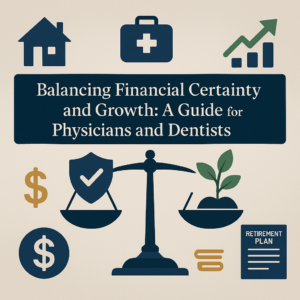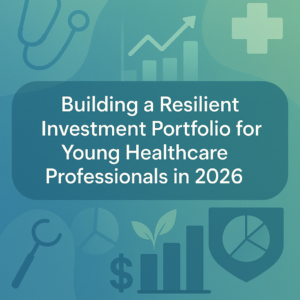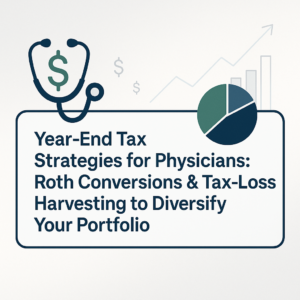Finding the Right Financial Advisor: A Guide for Young Healthcare Professionals
As a young healthcare professional stepping into the world of medicine, dentistry, pharmacy, physical therapy, or psychology, your primary focus is naturally on your patients and advancing your career. Yet, with the increasing complexity of financial planning, investment management, and wealth preservation, finding the right financial advisor has never been more important. This guide aims to help you understand what to look for in a financial advisor and how to build a lasting relationship that supports your personal and professional financial goals.
Understanding Your Financial Needs
Before you start searching for a financial advisor, it’s crucial to assess your own financial situation and goals. Are you looking to manage student loan debt, save for a home, invest for retirement, or plan for a family? Young physicians and other healthcare professionals often face unique financial challenges, such as high educational debt and delayed entry into the workforce.
Common Financial Goals:
- Debt Management: Strategies to pay off student loans efficiently.
- Investment Planning: Building a diversified portfolio to grow wealth.
- Retirement Savings: Starting early to maximize compound interest.
- Tax Planning: Minimizing tax liabilities through smart financial decisions.
- Insurance Needs: Protecting income with disability and life insurance.
What to Look for in a Financial Advisor
Choosing a financial advisor is a significant decision that can impact your financial well-being for years to come. Here are key factors to consider:
1. Credentials and Experience
Look for advisors with reputable certifications such as Certified Financial Planner (CFP) or Chartered Financial Analyst (CFA). Experience working with healthcare professionals can be a plus, as they will understand industry-specific financial challenges.
2. Fiduciary Responsibility
Ensure the advisor acts as a fiduciary, meaning they are legally obligated to act in your best interest. This reduces potential conflicts of interest and ensures unbiased advice.
3. Services Offered
Assess whether the advisor provides comprehensive financial planning, including investment management, retirement planning, tax strategies, and insurance recommendations.
4. Communication Style
Effective communication is essential. Your advisor should be approachable, responsive, and able to explain complex financial concepts in understandable terms.
5. Fee Structure
Understand how the advisor is compensated. Common models include fee-only, commission-based, or a combination. Transparency in fees helps you know exactly what you’re paying for.
6. Investment Philosophy
Align with an advisor whose investment approach matches your risk tolerance and financial goals. Whether it’s passive index investing or active portfolio management, their strategy should resonate with you.
The Importance of Long-Term Relationships
A financial advisor isn’t just for the moment; they’re a partner for your financial journey. Building a strong, long-term relationship can provide stability and confidence as your life and career evolve.
Consistency and Trust
Trust is the foundation of any advisor-client relationship. Consistent communication and transparency build this trust over time. Your advisor should keep you informed about your financial progress and any adjustments needed along the way.
Proactive Communication
Life is full of unexpected events—market fluctuations, career changes, personal milestones. A proactive advisor will reach out during these times to adjust your financial plan as needed.
Why Clients Switch Advisors
Understanding why some clients consider changing advisors can help you make an informed decision and avoid potential pitfalls.
Common Reasons for Switching:
- Lack of Communication: Infrequent updates or unresponsiveness.
- Mismatched Investment Philosophy: Strategies that don’t align with client goals.
- Fee Transparency Issues: Hidden costs or unclear fee structures.
- Life Changes: Significant events prompting a reassessment of financial needs.
By selecting an advisor who prioritizes these areas, you can foster a relationship that endures over time.
Steps to Finding the Right Advisor
Here is a step-by-step guide to help you in your search:
1. Start with Referrals
Ask colleagues, friends, or family members for recommendations, especially those in the healthcare field who may have similar financial needs.
2. Research Online
Use online resources to find advisors specializing in serving young healthcare professionals. Review their websites for information on services and philosophies.
3. Check Credentials
Verify their certifications and look for any disciplinary actions through regulatory bodies like the SEC or FINRA.
4. Interview Multiple Advisors
Schedule consultations to discuss your financial goals and assess how well you communicate with them. Most advisors offer a complimentary initial meeting.
5. Understand Their Approach
Ask about their financial planning process, investment strategies, and how they tailor their services to individual clients.
6. Evaluate the Fee Structure
Get a detailed explanation of all fees and expenses. Ensure there are no surprises down the line.
7. Trust Your Instincts
Choose an advisor you feel comfortable with and who demonstrates a clear understanding of your needs.
Maintaining the Advisor Relationship
Once you’ve chosen an advisor, nurturing the relationship is key to your financial success.
Regular Reviews
Schedule periodic meetings to review your financial plan and make adjustments as necessary. This keeps you on track toward your goals.
Open Communication
Keep your advisor informed about changes in your life, such as marriage, new job opportunities, or significant purchases. This information helps them advise you more effectively.
Feedback
Don’t hesitate to share your thoughts on the services provided. Constructive feedback can enhance the relationship and ensure your needs are met.
Conclusion
As a young healthcare professional, your time is valuable, and your financial future is important. Finding the right financial advisor can provide peace of mind and allow you to focus on what you do best: caring for others. By understanding your needs, knowing what to look for in an advisor, and fostering a strong relationship, you can navigate the complexities of financial planning with confidence.
Remember, the right advisor is out there—one who aligns with your values, understands your profession, and is committed to helping you achieve your financial goals.






